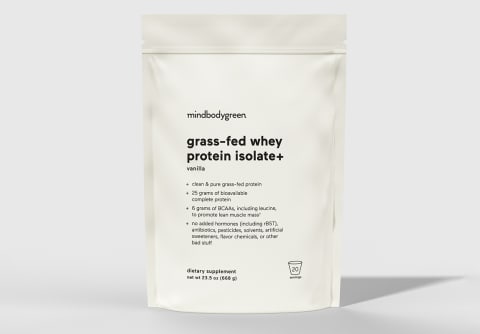Advertisement
A Breakfast Formula To Set You Up For Stronger & More Energized Days


Your mom wasn't wrong: Breakfast is the most important meal of the day. So it's time to banish the mornings of skipping breakfast or reaching for sugar-laden cereals, pastries, and (yes) even oatmeal that leave you feeling fatigued and hangry by lunch. Instead, set yourself up for success—at work, the gym, or home—by prioritizing protein for the first meal of the day.
Here's how to use protein to strengthen your breakfast game in 2024 and beyond.
Why is morning protein important?
Although most people currently eat the bulk of their protein for dinner (and only get about 13-15 grams1 for breakfast), you don't want to skimp on your morning intake of this macronutrient.
The latest research on protein timing shows that distributing out your protein intake2 in meals and snacks throughout the day is one way to help maximize muscle growth (in addition to eating enough protein in general). And if your daily goal is 100 grams of protein or more (and it likely should be), then you need to utilize all your meals to make that happen.
Another perk of protein-packed breakfasts? They are extremely satiating. Not only does protein help kick any mid-morning hunger pangs3, but it also sets you up for a more even-keeled appetite throughout the entire day.
Your new breakfast formula
Our formula for a successful (i.e., you feel full, alert, and energized) breakfast definitely places protein front and center. But it's just one part of the equation. Fiber and healthy fats are also essential for rounding out your plate.
- Aim for 30 grams of protein (or more): At a minimum, you should be reaching for 30 grams of protein at breakfast. You can do this by choosing foods like eggs, yogurt, cottage cheese, beef, turkey, chicken, and salmon. Animal sources of protein tend to be more complete and higher quality than plant sources—but you can check out the best proteins for vegans here.
- Choose fiber-rich foods: You don't need to avoid all carbs in the morning. Fibrous foods (like chia seeds, fruits, vegetables, and oats) are great options to curb hunger when you wake up and hours down the road.
- Add healthy fats: We typically consider healthy fats to be those foods high in monounsaturated fats (like olive oil, avocados, and peanut butter) or in omega-3s (like salmon and flaxseeds).
Everyone's nutrition needs differ based on age, activity level, health goals, and so on, and this formula provides a lot of flexibility to tailor to your preferences.
If you have higher energy needs, ramp up that protein even more and add even more nuts and seeds. If you want to lose fat, then up your fiber intake with non-starchy veggies.
Is a sweet or savory breakfast better?
This formula aligns better with a savory breakfast. Think about it: Pretty much all the high-protein examples above are savory in nature—although they often deviate from what we consider normal for breakfast.
But who cares! Take it from clinical nutritionist Kelly LeVeque, who has been known to eat leftover ground beef straight out of the fridge for her first meal. "When you eat enough protein, you really don't care what the other stuff you're eating is. You're so satisfied that the cravings hit the floor," LeVeque told us previously.
And if sweet is just your thing, that's OK too. Just consider leaning on a high-quality protein powder to give your meal an edge.
How whey protein can help
Whey protein (derived from milk) is one of the most studied protein powders available, and it's higher in essential amino acids like leucine than plant-based protein powders.
Whey protein isolate is a particularly concentrated source (90-95%) of animal protein with less than 1% lactose4—making it a more friendly choice for people with lactose intolerance.
mindbodygreen's grass-fed whey protein isolate+ is a clean option that provides 25 grams of whey protein in each (great-tasting) serving. Plus, each serving packs the necessary amount (2.5 grams) of the amino acid leucine to jump-start muscle growth.*
It's free of junk like artificial sweeteners and flavors. It doesn't have any stevia either, so it doesn't have the lingering aftertaste of most protein powders. Plus, it blends deliciously well in smoothies and overnight oats and withstands high temps so you can add it to hot oatmeal or baked goods, making achieving a protein-packed breakfast a breeze.
Your stronger together plan
Set a strong base
Does hitting that 30-gram benchmark feel intimidating to you? The first step is familiarizing yourself with exactly what that amount of protein looks like and then planning your meal around it. Once you have that figured out, you can fill in the rest of the meal with fiber (here are our top choices) and fat (these are our picks).
- 4 oz chicken breast (35 grams5)
- A smoothie with 1 serving grass-fed whey protein isolate (25 grams) & ¼ cup plain Greek yogurt (6 grams)
- 4 oz 90% lean ground beef (30 grams6)
- 1 cup Greek yogurt (24 grams) & 2 tablespoons peanut butter (8 grams)
- 1 cup cottage cheese (24 grams7)
- 2 eggs (12 grams8) & 3 ounces ground turkey (23 grams9)
- ¾ cup tofu crumble for a tofu scramble (33 grams10)
Check out these high-protein breakfast recipes for even more inspo.
The level-up
Feel confident about hitting your morning protein goals? Level up by making sure you fit in this meal within 90 minutes of waking up—the time that you're most metabolically active11. This is what LeVeque practices and what she encourages her clients to do too.
11 Sources
- https://www.ncbi.nlm.nih.gov/pmc/articles/PMC8048646/
- https://pubmed.ncbi.nlm.nih.gov/34233179/
- https://www.mdpi.com/2072-6643/13/8/2840
- https://www.ncbi.nlm.nih.gov/books/NBK44624/#ch3.s20
- https://fdc.nal.usda.gov/fdc-app.html#/food-details/171534/nutrients
- https://fdc.nal.usda.gov/fdc-app.html#/food-details/174031/nutrients
- https://fdc.nal.usda.gov/fdc-app.html#/food-details/328841/nutrients
- https://fdc.nal.usda.gov/fdc-app.html#/food-details/172187/nutrients
- https://fdc.nal.usda.gov/fdc-app.html#/food-details/171506/nutrients
- https://fdc.nal.usda.gov/fdc-app.html#/food-details/172475/nutrients
- https://www.ncbi.nlm.nih.gov/pmc/articles/PMC6835928/
